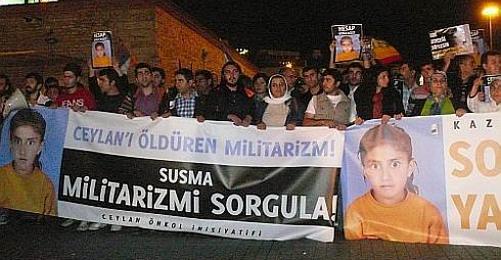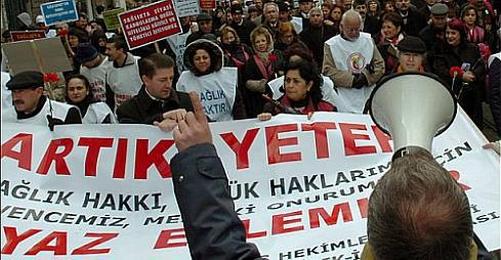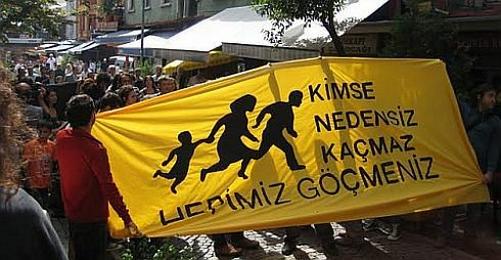Journalists Want Organized Labour in Media
The target of this Forum is to bring different practices together to discover the opportunities and limits of a democratic, participating and independent media and to take a step towards creating "a different kind of communication".
Because of this, prior to the Forum we wondered "what kind of a media" people really want and addressed this question to journalists at heart of that media. This is the first part of a series that will continue until the forum itself.
If you would like to express your own views, please do so by writing to [email protected].
Independent, participatory and indiscriminating
Journalists we questioned had the same answer to "what kind of a media do you want?". Their common response was "a media where workers are organized". Another reply was "an independent media with a clean and spare expression".
While some journalists have defended that an organized media labour would only be possible through a total change of the system itself, others believe the concept of a "new media" can be achieved by supporting the already existing organization within the system.
According to women journalists, the media comes at top of the sexist sectors in Turkey. According to them, the media should also respect equality.
Monopolization, on the other hand, erodes the confidence in the media both of those reading news reports and those producing them. While thinking of how to make ends meet by the end of the month, creating an agenda becomes almost impossible for a journalist.
Adnan Keskin and Efnan Atmaca from the daily Radikal, Milliyet newspaper's Huseyin Ozdemir and Gokcer Tahincioglu, Kemal Goktas from the Vatan newspaper and Cumhuriyet daily's Berivan Tapan answered bianet's questions on the issue.
Keskin: Bosses are organized, we are not
Radikal newspaper reporter Keskin said the issue that was neglected most in journalism was "democratic organization", stressing that reporters had to participate in production. He also said the way in which a report filed appeared in a newspaper was an important problem.
Keskin said that reporters were not consulted when their news items were changed and that they had difficulties in claiming responsibility for their own news. He defends that this problem can be overcome with reporters being part of the production process at newspapers.
Saying "Someone else prepares the newspaper and the reporter is not part of that process. The Editor-In-Chief or Editor may make changes to the news item but at this point, the journalists must have the right to voice their views" Keskin argued that the participation of the reporter should not be limited to routine news meetings but at the level of deciding on what is news and what is not.
Underlining that preparing a news item was "a process of thought and information" Keskin said that because of this a journalist need to have sufficient facilities for this and be able to monitor as well as hold others accountable.
"We must be journalists who can participate in the production process and able to raise questions about it" Keskin said, adding that this would contribute to less erosion of ethics. Noting that the rights of newspaper owners themselves were protected by unions, Keskin believes that on the other hand journalists lack an organization. He says the most fundamental form of organizing is through unions.
Tahincioglu: Organizing should be compulsory, not courageous
Milliyet newspaper reporter Tahincioglu says the most important problem faced by journalists is equal opportunity and believed reporters should find their places in the profession according to their abilities.
Tahincioglu notes that the education system in Turkey is "full of gross inequalities" and that there is an understanding that universities are not academies themselves but function as if they were lycees providing jobs. By not forgetting that the profession itself is based on a mentor-apprentice relationship he says, inequality could be prevented from the very start.
According to Tahincioglu, the media he wants to see is one where "being organized is not a choice but regarded as compulsory". He adds, "it is a true controversy that journalists covering thousands of union actions every year have to make a courageous choice to be organized in a media that gives so much importance to international standards in every field".
A journalist, says Tahincigoglu, should be seen not only as someone relaying something, but a person who lives, who has an attitude and a view, who shapes what is written according to these. He says it needs to be understood that reporting requires a serious amount of labor and that recognizing this would create a media with less problems and a more just distribution of income.
"Lastly, on the issue of choice of news, journalism focused on people and based on rights is more compatible with the international criteria of journalism" he says. "I believe that this criteria will allow for greater problems to be understood and be solved easily".
Goktas: A media not provoking war is required
Pointing out that the problem in the media stems from capital, Vatan newspaper reporter Goktas describes the media he envisages as a media "that has achieved editorial independence, that is not involved in provoking war, one that defends the interests of the larger society, that is distanced to sexual discrimination and that does not have taboos".
Recalling that newspapers are products created by large capital, Goktas says that because of this, concentrated capital groups have the say in the media.
Goktas believes that under the current system a new structuring would be difficult and adds "with its current order, the structure and functionality of the media cannot be separated from the economic and political system".
According to Goktas, being organized would in part deal with the problems and at least create some room to move.
Women journalists...
Berivan Tapan is one of the young reporters of the Cumhuriyet newspaper. Tapan started off by questioning the kind of journalism education being offered at universities in Turkey. According to her, there is a direct contrast between the education given and the work undertaken.
"Youngsters who come face to face with this situation while still trainees end up directing themselves to other fields with bags full of disappointment" she says. Tapan believes that those who do want to continue in the profession do so in belief that one day the sector will change and there will be a need for them.
"Those who stay, however, face hard days ahead" she warns. "Especially if you are woman" referring to degrading commentaries on women in the media itself, particularly to reaction of women becoming columnists.
Tapan believes these are dangerous and such approaches that turn back women from the sector and says that as in every other sector, inequality between women and men is a reality of the media sector.
"The only difference here" she explains, "is that we find the men are literate. The only thing different is that they have diplomas".
Money comes, ethic goes...
Two other issues Tapan highlights as problems in the media are censorship and desktop journalism:
* There is no need to sensor media journalists because everyone is already engulfed in auto-censorship. But auto-censorship will only allow you to stay in the media environment you are working it, it does not make you a better journalist.
* Many news items in the media are now locked into news agencies. Reporters themselves have become "agency readers". To leave a desk and actually pursue a news report is now being considered as "simplicity". Because there is a more practical method: Benefiting from internet news...
Tapan believes that voicing the hope of an independent media is as mad as requiring mental treatment and says there's no difference whatsoever whether the media organization is "leftwing" or "rightwing" so long as money is entering it. According to her, this means receiving advertisements takes a priority over everything and that is what is being pursued. "Money comes, ethics goes" she says.
"An independent media that clearly expresses things"
Complaints voiced by Radikal's Efnan Atmaca are similar to those of Tapan.
Atmaca says that the disappointment of those who have entered the media sector in the past two years is increasing by the day and wants a "media that is independent and has thus proven its reliability" that clearly expresses things.
But Atmaca notes that monopolization is eroding the confidence of the readers as well as workers in the media and that brings about auto-censorship as the greatest threat in front of journalists.
"No one trusts the media"
According to her, the monopoly created destroys all mechanisms of resistance for those working in the sector. The threat of being unemployed and knowing that the situation is the same in all institutions makes these developments a reality that is no longer rejected, she says.
"Those who do raise their voices" she adds, "are thrown out of the system. The weakness of an independent media makes their cry against this system weak too. Because of these, journalists want an independent media".
Atmaca notes that another problem of monopolization is that it overshadows labor and says that not being paid proportionally for the labor given is a fundamental problem that breaks the opposition of those who believe in the profession.
"For journalists who earn just under what they need to live, principles such as opposing or creating agendas lose their importance" she says.
"Media is one of Turkey's most sexist sectors "
Just like Tapan, Atmaca also says that "even if its said to be the opposite, the media is one of the most sexist sectors in Turkey".
"It is enough to take a look at remarks such as 'living a life of partners, mistress' that appear" says Atmaca, adding "because of these, in my own name I want a media that is based on equality, that gives value to labor and is independent".
There is no alternative
Huseyin Ozdemir is a photo-reporter for the Milliyet newspaper. We can understand what kind of a media he wants and what kind of a media he doesn't want.
"There are two monopolies in Turkey" he explains. "One of them owns 70% of the cake and the other owns 25% of it. The remaining 5 percent is alternative. Because of this neither the reader nor who watches believes in the source of media".
Ozdemir tells us of an experience:
"We were going to do a news report on a soldier's funeral. There were four funerals. Everyone was aggrieved. But the father of the deceased was not allowing us to take photographs. When we asked him the reason, we gathered why he was reacting. 'Go and take a picture of a model' he said angrily. Because he knew a magazine news item could appear together with the news of his grief in the newspaper. In other words, he has no belief in the media".
The media is far from being the voice of masses
According to Ozdemir, this media monopoly is far from being the voice of masses.
Referring to a writer of a mainstream newspaper he asks "Is Erman Toroglu a journalist? But with a single word of his, the chicken or vegetable sectors go down. He is the one who is believable. What is scary is for the Toroglu's to increase".
Ozdemir gives another experience::
"I took the pictures of Pinar Selek's interview in the Milliyet newspaper. Therefore I heard what the reporter asked Selek and what Selek said in response and how. A long while after the interview, a day before Selek's court case was to be heard, there was a small news item. The sentences had been carefully selected. As if Selek was saying something else. After the incident the mistake was accepted by the newspaper itself but what would have been proper is that this incident never took place". (EZO/AO/EU/II/YE)
Politician and NGOs Urge for Clarification of Önkol's Death

EU PROGRESS REPORT
Women's Rights Must be Implemented in Daily Life

Protests against Health Care Contribution Rate

Greens Launch Trial for Palovit Valley

"When Will Mohsen Abdolkhani and Hamid Karimnia Be Released?"







